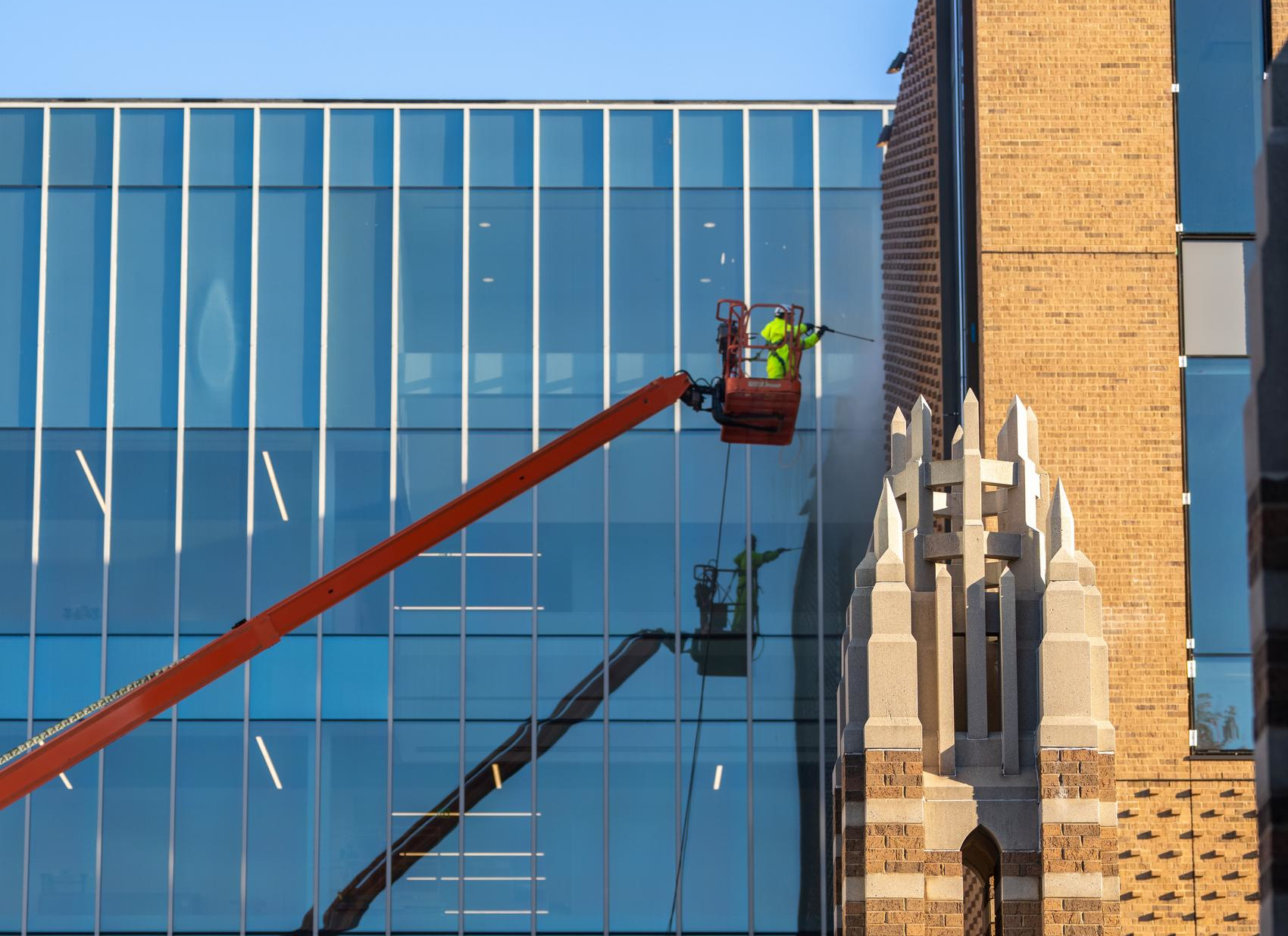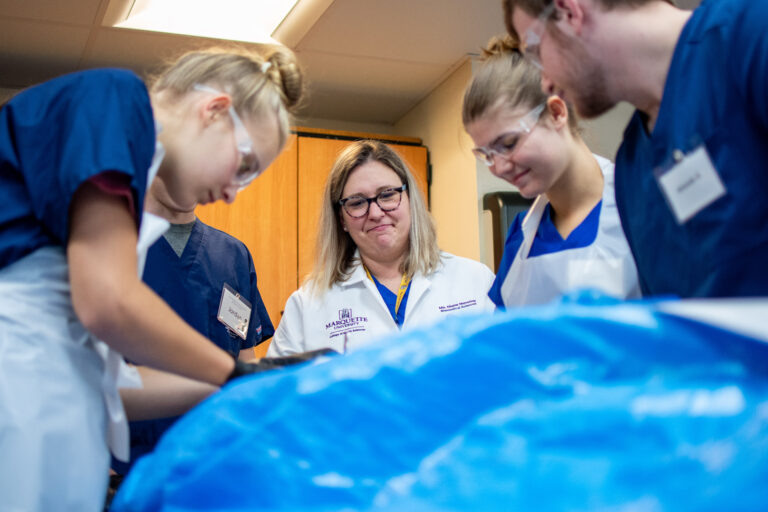Early in his presidency, President Michael R. Lovell announced an ambitious Campus Master Plan to integrate academic, physical and financial priorities and serve as a road map for Marquette’s capital projects during the next 10 to 20 years.
Since the plan was adopted in 2015, Marquette has undergone bold, innovative changes to its built environment — an evolution that has transformed the way we live, learn and work on campus.
With signature projects like The Commons residence hall facility, Athletic and Human Performance Research Center, Physician Assistant Studies building and an inspiring St. Joan of Arc Chapel preservation effort, Marquette has transformed how we enrich the student experience, advance research and scholarship, and nurture faith formation.
In fact, many of the projects outlined in the Campus Master Plan are either complete or in progress. A committee was formed last year to begin programmatic planning for a BioDiscovery District in the heart of campus.
Now, on the heels of a newly announced Strategic Planning 2030 initiative and with the doors of Dr. E. J. and Margaret O’Brien Hall — the new home for Marquette Business and innovation leadership programs — set to open in January 2023, the Marquette community has its collective gaze fixed on 2024: a year that will mark one of the most physically transformational periods in university history.
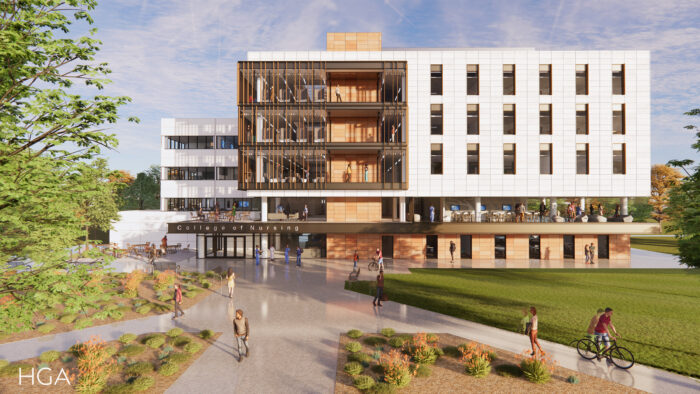
A new home for our growing College of Nursing
When O’Brien Hall — the largest fully donor funded building project in Marquette history — officially welcomes its first students in January, Marquette Business and innovation leadership programs will leave vacant its longtime home, David A. Straz, Jr. Hall.
That’s welcome news for Marquette’s College of Nursing. With its undergraduate nursing program ranked 29th nationally by U.S. News & World Report, the college is poised to prepare as many as 5,000 new Marquette Nurses over the next decade as part of a bold expansion initiative that calls for increased enrollment, greater diversity, continued innovation — and a new home.
In looking at existing campus spaces through the lens of the Campus Master Plan, Vice President for Planning and Facilities Management Lora Strigens says a fully and boldly reimagined Straz Hall emerged as an excellent solution to accommodate nursing’s strategic growth.
Construction is set to begin this month on the large scale expansion and renovation project. Nursing will move from its current home in Clark Hall to its reimagined facility in the heart of campus in 2024.
As with any vacated campus spaces, Strigens says, plans for Clark Hall will be determined through a future Campus Master Planning process.
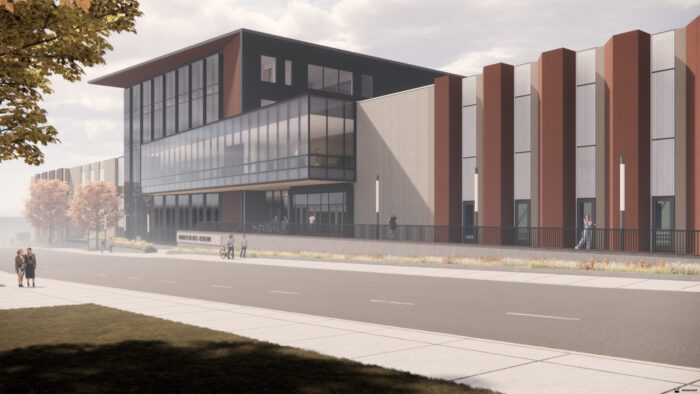
Reimagined Wellness + Recreation facility will help build a ‘culture of wellness’ at Marquette
Creating a centralized hub for all facets of health and wellness at Marquette has long been a priority for President Lovell and a key part of the Campus Master Plan.
To do this, Marquette is fully reimagining the Helfaer Tennis Stadium and Recreation Center on the southwestern edge of campus as a comprehensive Wellness + Recreation facility. When it opens in January 2025, it will bring together campus fitness and recreation facilities with the Counseling Center and the Marquette University Medical Clinic — centralizing student services that are currently dispersed across campus. The effort was spurred on by an anonymous alumni couple who, in late-2021, launched a $10 million giving challenge to help fund the new facility.
“When complete, the facility will position recreation, fitness, clinical and mental health services under one roof,” President Lovell says. “It will eliminate any stigma for anyone walking in the facility no matter what services they need. When you think about the future of wellness on campus, we want to be the example to which other universities aspire.”
The approximately 180,000-square-foot Wellness + Recreation facility will combine completely renovated portions of the Rec Center, including significantly updated facades with added windows, along with a newly constructed three-story wellness tower that will sit in the core of the facility. Using an existing building footprint and some of its structures supports sustainability and fiscal responsibility.
The tower’s third and fourth floors will be named the Lovell Center for Student Well-Being in recognition of Mike and Amy Lovell’s tremendous leadership to address mental health across Milwaukee and the region.
Construction is set to begin in January 2023, and the facility is expected to open to the campus community in January 2025. To accommodate the renovations and construction, the university has improved and added across campus a series of interim spaces for fitness, recreation and club sports that will be available beginning in January 2023.
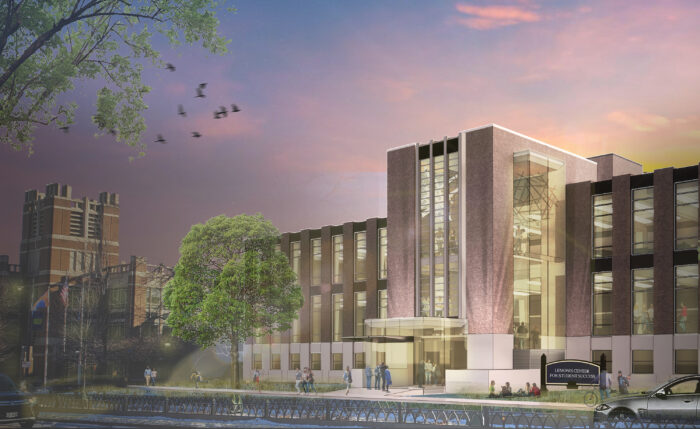
Lemonis Center will be central to student success
President Lovell in 2021 announced a new Student Success Initiative as one of the university’s top strategic priorities. To enhance and scale Marquette’s efforts to drive this priority forward in the most visible way possible, alumnus Marcus Lemonis, star of HGTV’s The Renovator, CNBC’s The Profit and chairman and CEO of Camping World, and his wife Bobbi, donated $15 million to create the Lemonis Center for Student Success.
In recognition of this leadership gift, Marquette will rename Memorial Library to the Lemonis Center for Student Success and house the new center in the highly visible, centrally located space on West Wisconsin Avenue and 13th Street.
“Ultimately, this transformational facility upgrade will drive Marquette to fully reimagine student success into a physical space that will serve as a new home for comprehensive support services,” President Lovell says. “The Lemonis Center for Student Success will build on Marquette’s Catholic, Jesuit tradition by helping students engage in thoughtful discernment that is infused in Ignatian education, emphasizing a deep sense of connection and meaningful engagement.”
Architectural, student experience and space utilization planning for the Lemonis Center is underway; the university expects construction to begin in 2023 and the renovation is targeted for completion in 2024.
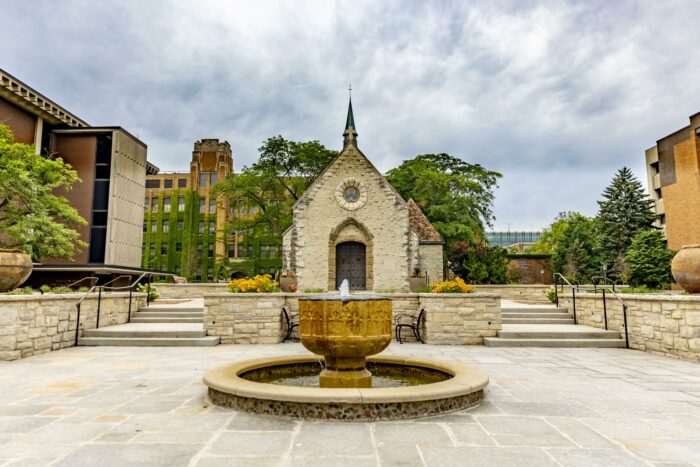
Meeting Marquette’s academic, scholarly and spiritual needs for generations
Marquette’s Campus Master Plan is about much more than marquee construction projects. In perhaps the most inspirational development, the university raised necessary funds to preserve the historic St. Joan of Arc Chapel and construct a Marian Grotto in its newly revitalized gardens.
Additionally, the university created and enhanced green spaces such as Eckstein Common, made significant upgrades to its infrastructure, and added nationally recognized sustainable solutions campuswide.
Marquette in May 2022 made a strategic real estate transaction when the university sold an 11-acre parcel of land it purchased in 2014 and 2015, located to the northeast of the Marquette Interchange, to Bear Development who, together with Kacmarcik Enterprises, plans to develop the area into a vibrant sports and entertainment district known as the “Iron District.”
The development will serve as a catalyst for the region and will play a pivotal role in linking downtown Milwaukee, the Menomonee Valley, the Near West Side neighborhood and Marquette University. The Iron District’s new soccer stadium will serve as the home competition field for Marquette men’s and women’s soccer and men’s and women’s lacrosse teams.
Strigens says one of the Campus Master Plan’s great successes was its collaborative nature. “I am proud of the way we engaged the campus community and established a culture around healthy dialogue about transforming our physical environment,” she says. “We will endeavor to reinvigorate that same level of engagement as we engage the next master planning process.”
While 2024 will be a watershed year for Marquette in terms of executing on priorities outlined in the Campus Master Plan, it doesn’t mark the plan’s completion.
“A Campus Master Plan is only as strong as how well it evolves and anticipates strategic shifts in the university’s priorities,” Strigens says. “For sure, 2024 will be a significant moment for Marquette University — but we aim for decades’ more significant moments. It will be incumbent upon us as we develop and launch the new strategic plan that we view the Campus Master Plan as an integral companion, so that we can ensure Marquette’s physical campus meets its academic, scholarly and spiritual needs for generations to come.”
